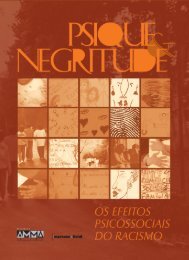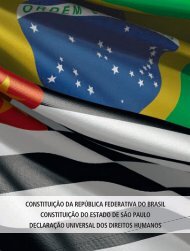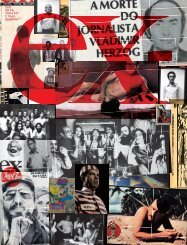CLÁSSICOS BRASILEIROS BRAZILIAN CLASSICS - Imprensa Oficial
CLÁSSICOS BRASILEIROS BRAZILIAN CLASSICS - Imprensa Oficial
CLÁSSICOS BRASILEIROS BRAZILIAN CLASSICS - Imprensa Oficial
Create successful ePaper yourself
Turn your PDF publications into a flip-book with our unique Google optimized e-Paper software.
Brazilian Classics<br />
A selection of authors with works in public domain<br />
104<br />
SÍLVIO ROMERO<br />
(1851 – 1914)<br />
The adjectives usually associated to Silvio<br />
Romero's works are always intensifiers:<br />
magnificent, monumental, giant, imposing,<br />
encyclopedic, etc. It happens that the profuse<br />
character of his intellectual work was at a time<br />
his highest virtue and his worst sin: concerned,<br />
for instance, with defending the Province against<br />
the Portuguese domination, he even attacked<br />
Machado de Assis and Castro Alves, but praised<br />
Tobias Barreto, supporting that Tobias Barreto<br />
was the greatest Brazilian poet and thinker. His<br />
History of the Brazilian literature, of utmost<br />
importance, was the first literature systemization<br />
effort in Brazil. All that was said about the author<br />
holds true in relation to this work: although<br />
erring in being too profuse, he was nevertheless<br />
a true encyclopedia in which our culture is<br />
concerned. But his performance would not be<br />
restricted to literature. He also wrote about<br />
politics, folklore, philosophy, law, and ethnology,<br />
always imprinting on such areas the force of his<br />
passion and the vastness of his knowledge, as<br />
well as his temperament.<br />
Review<br />
Main works<br />
Excerpt<br />
History of Brazilian literature<br />
There is a wall which represents the many<br />
millennia of struggles during which time<br />
humanity acquired all the qualities that are<br />
today mankind markers. Climates become mere<br />
backdrops whilst the ethnic, physiologic and<br />
moral agents come to the foreground. In the<br />
case of our history, the constant factor, over the<br />
four centuries alreody gone by, has always been<br />
the Portuguese. In the transition to Brazilian,<br />
an ethnological element, hybridization, will<br />
account for the phenomenon. Climate is in the<br />
background.<br />
Climate, assumed in its most generic meaning, I<br />
insist, was a brave agent in the formation of races<br />
and autochthonous civilizations.<br />
During the specifically historical times, climate<br />
action still had a role; but no longer significant or,<br />
at least, not as much as the people hybridization<br />
phenomenon.<br />
For thousands of years, climate was able to shape<br />
the prehistoric races and outline present day's<br />
people. But it had such a slow action that it can<br />
hardly be noticed in modern civilizations.<br />
A nationallst criticlsm<br />
"História da Literatura Brasileira (History of Brazilian Literature), by Sílvio Romero, is one of those books that protect the<br />
people against aggression and against discouragement, like fortresses and, at the same time, temples, standing up against<br />
those who disbelieve the national values of culture and attack such values for considering them ruinous or bad."<br />
(Gilberto Freyre, O Cruzeiro)<br />
Literature's giant<br />
"Sílvio's contribution to the literary nationalism is, thus, all the most relevant. The ideas he espoused, determinism and<br />
socialism, helped him develop the nationalist legacy, by disengaging it from the romanticism vague idealistic notions,<br />
and consolidating himself by acquiring more solid doctrinaire foundations. His position brings to a successful conclusion<br />
the transition from romanticism and indianism to an Americanism or Brazilianism, where the Brazilian regions contribute<br />
according to their own peculiar character."<br />
(Afrânio Coutinho, "A Tradição Afortunada")<br />
História da literatura brasileira (1888); Ensaios de sociologia e literatura (1901); Martins Pena (1901); Pinheiro Chagas<br />
(1904); Evolução da literatura brasileira (1905); Outros estudos de literatura contemporânea (1905); O alemanismo no sul<br />
do Brasil (1906); Compêndio de história da literatura brasileira (1906); Discurso (1907); Zeverissimações ineptas da crítica<br />
(1909); Da crítica e sua exata definição (1909); Provocações e debates (1910); Quadro sintético da evolução de gêneros<br />
na literatura brasileira (1911); Minhas contradições (1914).









